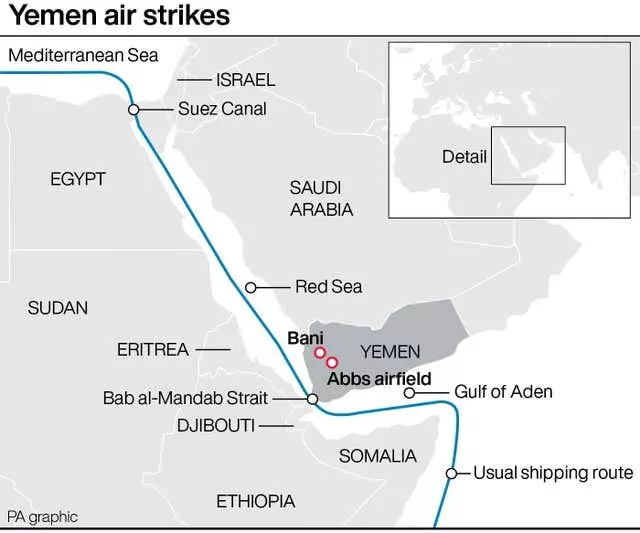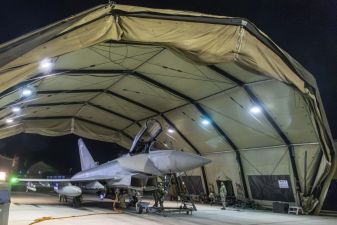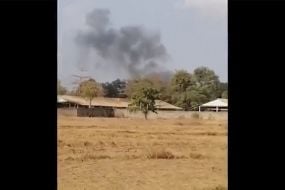The US Navy has warned American-flagged vessels to stay out of areas around Yemen in the Red Sea and the Gulf of Aden for the next 72 hours after the US and Britain launched multiple air strikes targeting Houthi rebels.
The warning in a notice to shippers came as Yemen’s Houthis vowed fierce retaliation for the US-led strikes, further raising the prospect of a wider conflict in a region already beset by Israel’s war in Gaza.
US military and White House officials said they expected the Houthis to try to strike back.
And President Joe Biden warned on Friday that the group could face further strikes.
The US-led bombardment – launched in response to a recent campaign of drone and missile attacks on commercial ships in the vital Red Sea – killed at least five people and wounded six, the Houthis said.
The US said the strikes, in two waves, took aim at targets in 28 different locations across Houthi-controlled areas of Yemen.
“We will make sure that we respond to the Houthis if they continue this outrageous behaviour along with our allies,” Mr Biden told reporters during a stop in Emmaus, Pennsylvania.
Asked if he believes the Houthis are a terrorist group, the president responded: “I think they are.”
The White House said in November that it was considering redesignating the Houthis as a terrorist organisation after they began their targeting of civilian vessels.
The Biden administration formally delisted the Houthis as a “foreign terrorist organisation” and “specially designated global terrorists” in 2021, undoing a move by President Donald Trump.
Lt Gen Douglas Sims, director of the Joint Staff, said that the new US strikes were largely in low-populated areas, and the number of those killed would not be high.
He said the strikes hit weapons, radar and targeting sites, including in remote mountain areas.
As the bombing lit the pre-dawn sky over multiple sites held by the Iranian-backed rebels, it forced the world to again focus on Yemen’s years-long war, which began when the Houthis seized the country’s capital.
Since November, the rebels have repeatedly targeted ships in the Red Sea, saying they were avenging Israel’s offensive in Gaza against Hamas.
But they have frequently targeted vessels with tenuous or no clear links to Israel, imperilling shipping in a key route for global trade and energy shipments.
The Houthis’ military spokesman, Brigadier General Yahya Saree, said in a recorded address that the strikes would “not go unanswered or unpunished”.
Representative Elissa Slotkin, a Michigan Democrat and former US intelligence official, welcomed the US strikes but expressed concern Iran was aiming to draw the US deeper into conflict.
“We should be worried about regional escalation,” Ms Slotkin wrote on X.
“Iran uses groups like the Houthis to fight their battles, maintain plausible deniability and prevent a direct conflict with the U.S. or others. … It needs to stop, and my hope is they’ve gotten the message.”
The British military’s United Kingdom Maritime Trade Operations, which oversees Middle East waters, reported on Friday evening a new missile attack off Yemen.
It said the missile was fired towards a ship some 90 miles south-east of Aden, Yemen, while the ship was being followed by three small vessels.
The shipmaster reported missiles landing in the water 400 to 500 metres away, but they caused no injuries or damage, the organisation said.
“Vessels are advised to transit with caution,” it warned.
Though the Biden administration and its allies have tried to calm tensions in the Middle East for weeks and prevent any wider conflict, the strikes threatened to ignite one.
Saudi Arabia – which supports the government-in-exile that the Houthis are fighting – quickly sought to distance itself from the attacks as it seeks to maintain a delicate detente with Iran and a ceasefire it has in Yemen.

It remained unclear how extensive the damage was, though the Houthis said at least five sites, including airfields, had been attacked.
The White House said on Friday the US military was still assessing the extent to which the militants’ capabilities might have been degraded.
US Air Forces Central Command said the strikes focused on the Houthis’ command and control nodes, munition depots, launching systems, production facilities and air defence radar systems.
The strikes involved more than 150 precision-guided munitions, including air-launched missiles by F/A-18 Super Hornets based on the USS Dwight D Eisenhower, and Tomahawk missiles from the Navy destroyers USS Gravely and USS Mason, the Navy cruiser USS Philippine Sea, and a US submarine.
The United Kingdom said strikes hit a site in Bani allegedly used by the Houthis to launch drones and an airfield in Abbs used to launch cruise missiles and drones.
Meanwhile, the US Treasury Department on Friday announced it imposed sanctions on two firms in Hong Kong and the United Arab Emirates for allegedly shipping Iranian commodities on behalf of Iran-based Houthi financial facilitator Sa’id al-Jamal.
Four vessels owned by the firms were also identified as blocked property.
In a separate development, Iran released footage of its seizure of an oil tanker in the Gulf of Oman that had once been at the centre of a dispute between Tehran and Washington.
In the footage, a helicopter hovers over the deck of the St Nikolas.
Iran’s navy seized the vessel on Thursday.
The vessel had been known earlier as the Suez Rajan.
The US seized one million barrels of sanctioned Iranian oil off the vessel last year.
Hussein al-Ezzi, a Houthi official in their Foreign Ministry, said that “America and Britain will undoubtedly have to prepare to pay a heavy price and bear all the dire consequences of this blatant aggression”.
The Red Sea route is a crucial waterway, and attacks there have caused severe disruptions to global trade.
Benchmark Brent crude oil traded up some 4% on Friday at more than 80 dollars a barrel.
Tesla, meanwhile, said it would temporarily halt most production at its German factory because of attacks in the Red Sea.

Meanwhile, the US Navy acknowledged an attack days earlier on a ship in the far reaches of the Indian Ocean – an attack that may signal Iran’s willingness to strike vessels as part of a wider maritime campaign over the Israel-Hamas conflict.
Tehran on Thursday separately seized another tanker.
In Saada, the Houthis’ stronghold in north-west Yemen, hundreds gathered for a rally on Friday, denouncing the US and Israel.
Another drew thousands in Sanaa, the capital.
Houthis now control territory that is home to some two-thirds of Yemen’s population of 34 million.
War and misgovernment have made Yemen one of the poorest countries in the Arab world, and the World Food Programme considers the vast majority of Yemen’s people as food-insecure.
Yemen has been targeted by US military action over the last four American presidencies.
A campaign of drone strikes began under President George W Bush to target the local affiliate of al Qaida, attacks that have continued under the Biden administration.
Meanwhile, the US has launched raids and other military operations amid the ongoing war in Yemen.
That war began when the Houthis swept into Sanaa in 2014.
A Saudi-led coalition including the United Arab Emirates launched a war to back Yemen’s exiled government in 2015, quickly morphing the conflict into a regional confrontation as Iran backed the Houthis with weapons and other support.
The conflict, however, has slowed as the Houthis maintain their grip on the territory they hold.
In March, Saudi Arabia reached a Chinese-mediated deal to restart relations with Iran in the hopes of ultimately withdrawing from the war.
However, an overall deal has yet to be reached, likely sparking Saudi Arabia’s expression on Friday of “great concern” over the air strikes.
“While the kingdom stresses the importance of preserving the security and stability of the Red Sea region … it calls for restraint and avoiding escalation,” its Foreign Ministry said in a statement.
Iran condemned the attack in a statement from Foreign Ministry spokesperson Nasser Kanaani.
“Arbitrary attacks will have no result other than fuelling insecurity and instability in the region,” he said.
In Beijing, Chinese Foreign Ministry spokeswoman Mao Ning called on nations not to escalate tensions in the Red Sea.

And Russia on Friday condemned the strikes as “illegitimate from the point of view of international law”.
Oman, long a regional interlocutor for the US and the West with Iran, condemned the air strikes.
It called the attack a “great concern while Israel continued its brutal war and siege of the Gaza Strip without accountability or punishment”.







